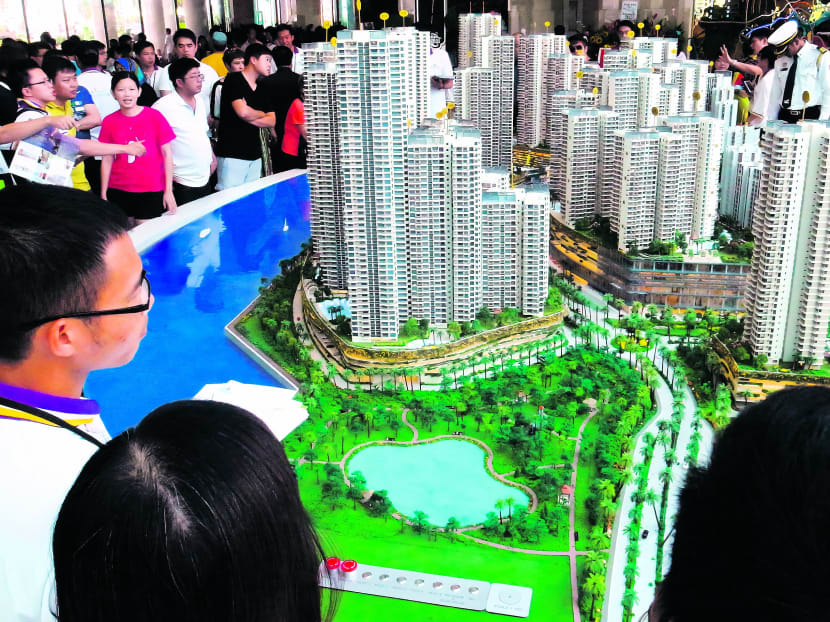Iskandar’s property investment appeal ‘likely to decline’
SINGAPORE — The clock is ticking for Singaporeans who want to buy a mass-market home in the booming Iskandar region, as foreigners will only be able to buy properties in Malaysia priced above RM1 million (S$390,000) from next year.

Singapore buyers were reported to have bought 30 per cent of the units sold at the Country Garden Danga Bay development in August. TODAY file photo
SINGAPORE — The clock is ticking for Singaporeans who want to buy a mass-market home in the booming Iskandar region, as foreigners will only be able to buy properties in Malaysia priced above RM1 million (S$390,000) from next year.
At that threshold, Singaporeans will not be able to buy the sort of property that they have been snapping up in droves. As a result, the region’s position as a top investment destination may take a hit, said analysts.
While there is no official data on property transactions in Iskandar, anecdotal evidence suggests that, although prices have been on a steep uptrend, the vast majority of homes there are priced below RM1 million, which means they will soon be off-limits to Singapore buyers.
Citing figures from Malaysia’s Ministry of Finance, Director of Ascendant Assets Getty Goh said in the first half of this year, only 1.5 per cent of property transactions within the Johor state was above RM1 million.
“Within Johor, Iskandar is the most active area, so the measure will have an impact on its attractiveness to Singapore investors,” Mr Goh said.
Chief Executive of Century 21 Singapore Ku Swee Yong also said interest in Iskandar will take a dip once Singaporean buyers are forced to look at pricier homes. “When you’re allowed to buy a unit at RM700,000, it’s quite affordable at about S$280,000; with the new minimum of RM1 million, it’s tougher.”
The new threshold will come into play at a time when Singaporeans looking for overseas property investments have been piling into Iskandar as they seek to exploit the special economic zone’s growth potential.
In August, Singapore buyers were reported to have bought 30 per cent of 5,000 units sold at the Country Garden Danga Bay condominium development.
But it is not only demand for new homes in Iskandar that will be affected by the rules. Singaporeans who have already bought investment property there may have a harder time making a quick profit once foreigners are edged out of the mass market.
“There will be disappointment for people who have bought in the past and are thinking about selling … if you bought something two years ago at RM600,000 and are trying to sell to a foreigner, you’ll have to wait as prices don’t appreciate so fast and it’ll take a while to reach RM1 million,” Mr Ku said.
The measure could have a significant enough effect on foreign demand that property companies may need to rethink their strategies.
Mr Ku said developers planning to launch new projects may have to “return to the drawing board” to resize units in order to price them above the RM1 million-mark to ensure they can still tap foreign demand.
“The timing is actually quite bad for some developers … those who are preparing to launch in the next six months might now withdraw their launches, unless they’re happy to just sell to Malaysians.”
Meanwhile, Iskandar Waterfront Holdings, the Malaysian developer which focuses on southern Johor, is reported to have postponed an up to US$300 million (S$374 million) initial public offering to the end of next year in order to observe how sales will be impacted by the doubling of the foreign buyer price threshold as well as the higher Real Property Gains Tax (RGPT).
The revised RGPT, which was also announced by Prime Minister Najib Razak in his Budget 2014 speech, will see foreigners taxed 30 per cent on gains they make on property sold within five years of purchase. After the fifth year, they are taxed 5 per cent.
But although these measures will have an impact on Singaporeans’ appetite for Iskandar property, analysts believe they are unlikely to kill the market completely, not least because they are relatively mild compared to those in place in Singapore.
They noted that the RGPT is a tax on the profit of a property sale, unlike the seller’s stamp duty here that is applied to the entire sales value.
“With the RGPT, you still take 70 per cent of the profits, which is still quite substantial,” said General Manager of real estate portal iProperty Sean Tan.
“The Malaysian policies are less harsh. Even at RM1 million, this quantum is still significantly lower than what is required to invest in Singapore property …
“I think Singapore investors will still view Iskandar favourably, although in the short run the impact might be more drastic.”
Agreeing, Mr Goh said: “In the long run, there’s still some push factor: The situation in Singapore’s property market, currency exchange is working in Singapore’s favour … I think investors with a more long-term view and who are prepared to pay RM1 million would stay in the market.”





